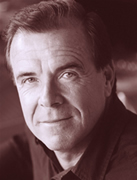The very modern interior of St. Stephen’s Episcopal Church heard a program of seventeenth-century instrumental music by a variety of composers, presented by TEMPO, and performed by the Aurora Baroque Ensemble (David Wilson, violin; Barbara Blaker Krumdieck, cello; Robbie Link, gamba; Henry Lebedinsky, organ). A pedantic curmudgeon (such as myself) would note that though the concert was titled “German Chocolate,” some of the works offered were produced in Austria and Bohemia as well.
The program opened with an attractive sonata for violin, gamba and continuo (cello, chamber organ) by Gottfried Finger, a composer born in Moravia whose greatest success came during his years in London, where he published extensively. Here the obligato line of the gamba was not well-balanced with the violin, being difficult to hear in the church’s acoustics.
David Wilson proved his mettle with the first of Biber’s Rosary sonatas, the “Annunciation.” Wilson possesses an excellent technique in the service of a refined taste and musicianship. His tone is particularly sweet, and beautifully modulated with excellent control of the bow. His intonation is pure, and he produces a singing line; in other words, a very fine musician indeed. Wilson went on to play a set of divisions on the familiar “Lachrimae” of Dowland, very expressively done with an enviable freedom in the ornamental figures.
Next up was a set of chorale variations by Matthias Weckmann, played by Lebedinsky on the Flentrop organ in the choirloft. With such a vast literature at his disposal, an organist must be careful to distinguish between music for concert and music for service. The Weckmann heard here, alas, was Gebrauchsmusik, senza pizzazz, con ho-hum assai.
The Schmelzer sonata which closed the first half was compromised somewhat by inexactness of intonation in the descending continuo pattern (repeated ad infinitum), and by an imprecision of rhythm in the continuo realization.
The second half began with an ensemble sonata by Rosenmuller, leading into the high point of the program, Miller’s transcendent reading of the solo Passacaglia by Biber, the work which closes the Rosary collection. It would be hard to imagine this difficult and rewarding work better played.
After a Pachelbel solo for organ, the group closed the program with one of the familiar and attractive trio sonatas for violin, gamba and continuo by Buxtehude, a charming work, but one which was somewhat beyond the technical capacities of gambist Link, particularly on the upper reaches of the neck.
All in all, an enjoyable program, but perhaps a shorter and more tightly focused offering would have been even more rewarding.











